Abstract
As a result of the radical socio-economic transformations taking place in the modern world the institution of family and marriage is being changed. Thus the problem of purposeful formation of family self-determination of student’s youth in the processes of education and training becomes particularly relevant on this background. The purpose of the conducted research is studying of features of family self-determination of student's youth depending on the education level. The results of the empirical research, which was attended by 1158 respondents, indicate that university students have more developed elements of cognitive, value-emotional, regulatory and behavioral, motivational, reflective component of family self-determination. College students are characterized by increased unproductive motives for marriage (compensation for feelings of loneliness, revenge), less negative attitude towards family conflicts, less depicted intrapersonal conflict in the marriage and family sphere than university students. Family self-determination is typical and achieved for the majority of university students. Diffuse family self-determination prevails with college students. According to this we suggest to introduce a psychology-pedagogical model of development of family self-determination which will provide activization of the process of family self-determination as inextricably linked with personal and social identity, formation of psychological competence of the sphere of matrimonial relationship, readiness for marriage and family life in the educational process of colleges.
Keywords: Family self-determinationstudent’s youth
Introduction
As a result of radical socio-economic changes taking place in the modern world, the institution of family and marriage is being transformed, largely due to the loss or insufficient performance of traditional family functions. The development of reproductology allows to perform an important function of childbirth, so many modern women do not perceive motherhood solely as a marriage and a family value. The educational function is realized, as a rule, by mothers together with social institutions: kindergartens, schools. Freedom in sexual relations devalues the importance of sexual-erotic function. In a modern family there is a weakening of economic function, there is no general family budget. Household problems are successfully resolved independently by each of the spouses due to the service sectors. Spiritual communication is realized among friends, adherents and colleagues. While in the pre-industrial era the patriarchal family served as a social care for elderly or incapacitated family members, in modern society an individual himself, thanks to the social security system, especially old-age pensions, meets his needs.
Alarming tendencies observed in the development of the institution of family and marriage are caused by absence in the educational process of schools, secondary and higher educational institutions of premarital education, as a systematic impact on the younger generation for the purpose of training and inclusion in the matrimonial relations, the formation of the identity of the family man now. At present time there are no public institutions in Russia allowing to form readiness for matrimonial relations, to develop skills of family self-determination of boys and girls. Readiness for creation of a family is a quality of personality that integrates in itself, on the one hand, acceptance of a family value, on the other hand, development of special knowledge and abilities in the sphere of family relations. Thus, there is an urgent need in creation of complete scientifically based approach for development of the concept of family self-determination in adolescence in psychological theory and practice.
Problem Statement
Family self-determination as complete psychological process that must be studied from a scientific point of view and in its entirety rather recently came to the sphere of attention of researchers. Dubrovina (2015b) believes that one of the important aspects of self-determination of an adult is the formation of his psychological readiness to create his own family in the future. "Self-determination” in this sphere, as in all others, is a complex and long process. It assumes that there are opened some different opportunities of self-realization, a choice of the way in this direction of life before the person.
Psychological readiness, first of all, includes the awareness of boys and girls that registration of marriage is not an end, but only an initial stage on the way of creating a family. Understanding that family happiness depends largely on how young people realize legal and moral basis of marriage. And, of course, how they have developed the ability to be truly loving, that is, the ability to love a person for his own sake
(Dubrovina, 2015a, pp.17-18).
Analysis of references showed that the problem of family self-determination was raised in the context of identifying socio-psychological factors of family self-determination of students of higher education (Melnikova & Sechko, 2016). Mukhtarova (2016) considers self-actualization as a factor in the development of family self-determination in adolescence. Earlier studies have found that structural and content characteristics of family self-determination are determined by social status and religion (Merzlyakova, 2016), type of structure of a parent family (Merzlyakova & Lokiaeva, 2018), parent-child relationship (Merzlyakova, 2014), cognitive abilities (Merzlyakova, 2018a). It is established that professional orientation and stage of training (course) play an important role in the process of family self-determination of modern students (Merzlyakova, Zhilkina, Zobnina, & Sokova, 2018).
Family values, marriage and parenthood are important phenomena of family self-determination of personality. Rean (2017) gives the results of a large-scale empirical research in which it is shown that family takes the first place in the structure of life values of young people. At the same time a large number of divorces is observed among young people. The author emphasizes that young people need to be specially prepared for a family life. The researches of Batarchuk (2014) are devoted to the analysis of value orientations and family relationships caused by national differences. A number of researchers study the role of a parental family in the formation of an image of future family which acts as the central component of family self-determination of the subject. Karabanova and Trofimova (2013) proved that "considering the ideas about future family (family values, role structure, emotional connections, future partner) young people are guided by the ideas about the patterns of functioning of a parental family" (p. 43). Karabanova (2010), Spivakovskaya (1999) and Ovcharova (2003) underline that a parent family sets a certain normative model of parenthood. Karabanova, and Molchanov (2017) analyzed the mechanisms of a parental family influence on the formation of parental attitudes. Alekseeva (2015) defined the role of child-parent relationships in the formation of family values and the image of the parent in adolescence. However, it should be noted that a dysfunctional parent family cannot form any effective models of marital and child-parent relationships in boys and girls. According to this the use of non-family forms of preparation of young people for a family life, which are able to resist the negative example of disharmonious parent families, should be carefully thought out and implemented. Educational institutions: schools, colleges, universities can play an important role in this. Purposeful formation of family self-determination occurs in the processes of education and training. However, empirical research aimed at studying the features of family self-determination depending on the level of education (general, secondary professional, higher) is not enough. The resolution of the contradiction between the need of modern society in the education of family values, preparation of young people for matrimonial relationship and the need to identify psychological and pedagogical conditions for the purposeful development of family self-determination of students determines the problem of research.
Research Questions
Today the following issues remain unresolved.
3.1. Are there any reliable distinctions in substantial and structural features of family self-determination between college students and university students?
3.2. What types of family self-determination are formed with college students and university students?
Purpose of the Study
The purpose of the study is to research the features of the content - structural characteristics of family self-determination of student’s youth depending on the level of education (secondary vocational, higher). We hypothesized that family self-determination of students in the process of their professionalization is determined by the level of education. In accordance with the purpose and hypothesis we have conducted a study aimed at solving the following problems.
The study involved 316 students of Astrakhan State Polytechnic College and Astrakhan College of Computer Science and 842 students of Astrakhan State University, Astrakhan Branch of Russian Academy of National Economy and Public Administration Under the President of Russian Federation, and Branch of Russian State Humanitarian University in Astrakhan;
Research Methods
In order to achieve the objectives and to test the hypothesis we used a set of complementary research methods.
5.1. For diagnostics of substantial and structural characteristics of family self-determination we used the method of semantic differential developed by Charles E. Osgood, the questionnaire “A Value and Availability Ratio in Various Vital Spheres Technique” by E.B. Fantalova (2001), a projective technique "Incomplete Sentences", “A Purpose-in-Life Test” by D.A. Leontiev (2000).
5.2. For the analytical stage we used mathematical and statistical methods that allowed us to establish the reliability of the results of the study. All calculations were performed using the computer program IBM SPSS Statistics 21. The analysis included descriptive statistics, Kolmogorov-Smirnov test for one sample, Mann-Whitney test, Student’s t-test for independent samples, factorial analysis, suitability analysis, cluster analysis.
Findings
Comparative analysis of the features of family self-determination between college students and university students
In order to assess the impact on family self-determination of such factor as the level of education, we carried out the analysis of the structural and content characteristics of the studied phenomenon among college students and university students. Using Kolmogorov-Smirnov test for one sample, it was found that the distribution of the variable meaningfulness of life corresponds to the normal law (
In the cognitive component of family self-determination of distinctions at the level of statistical significance were revealed for such elements as I-future husband / wife (U = 47999.5 at p < 0.0001), I-future father / mother (U = 53380.5 at p < 0.0001), I – host / hostess (U = 65343.5 at p < 0.0001), I - son / daughter (U = 61331.5 at p < 0.0001). In Figure
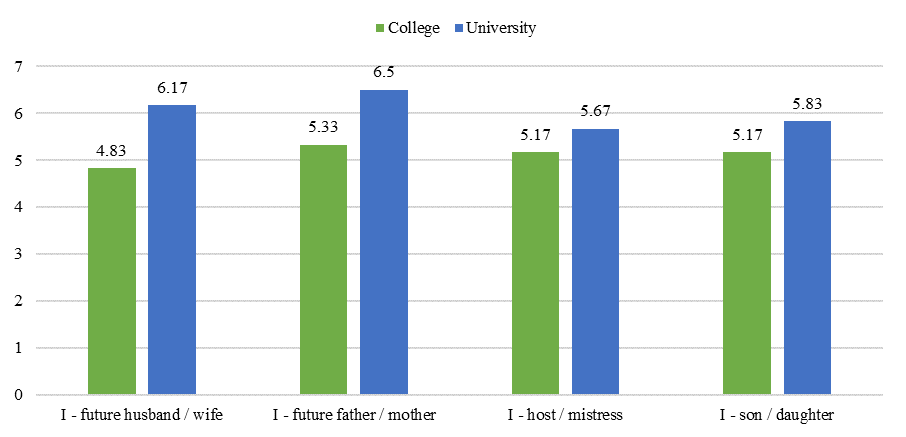
In the value-emotional component of family self-determination there were significant distinctions in measures such as parent family (U = 68687.5 at < 0.0001), marriage (U = 53135 at < 0.0001), my mother (U = 66330.5 at < 0.0001), my father (U = 65884.5 at < 0.0001), my future family (U = 51876 at < 0.0001), value of happy family life (U = 71639.5 at < 0.0001), value of life (U = 81981.5 at < 0.0001), attitude toward future marriage partner (U = 52109.5 at < 0.0001), attitude towards love of the romantic type (U = 60040 at p = 0.024), attitude towards family recreation and leisure (U = 51651 at < 0.0001). Figure
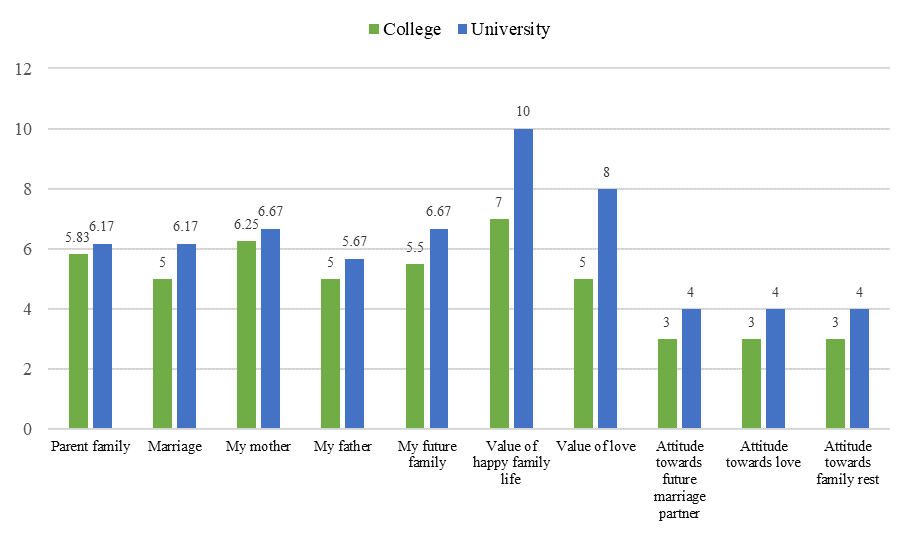
In addition, some significant distinctions were found in such elements of value-emotional component of family self-determination as life-meaningful orientations: goals in life (U = 58799 at p = 0.003), process of life (U = 59396 at p = 0.014), effectiveness of life (U = 57374 at p < 0.0001), meaningfulness of life (t = -3.986 at p < 0.0001). The meanings of the medians indicate that university students are more motivated, perceive their own life as interesting and emotionally rich, meaningful, and productive, than college students (see Figure
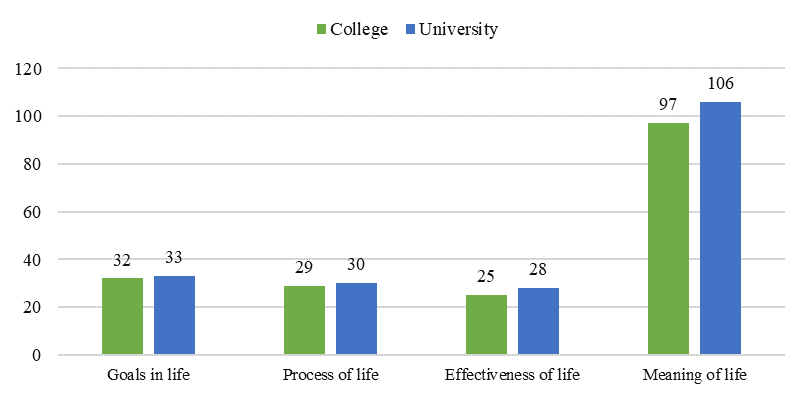
In the regulatory and behavioral component of family self-determination there were revealed significant distinctions in elements such as my present (U = 59335.5 at p < 0.0001), my future (U = 45001 at p < 0.0001), availability of areas of happy family life (U = 113050 at p = 0.009) and dynamic active life (U = 109432 at p < 0.0001), attitude towards family conflicts (U = 60218 at p = 0.028). In comparison with college students, university students are characterized by greater value of present and future, availability of areas of a happy family life and a dynamic active life, more negative attitude towards family conflicts (Figure
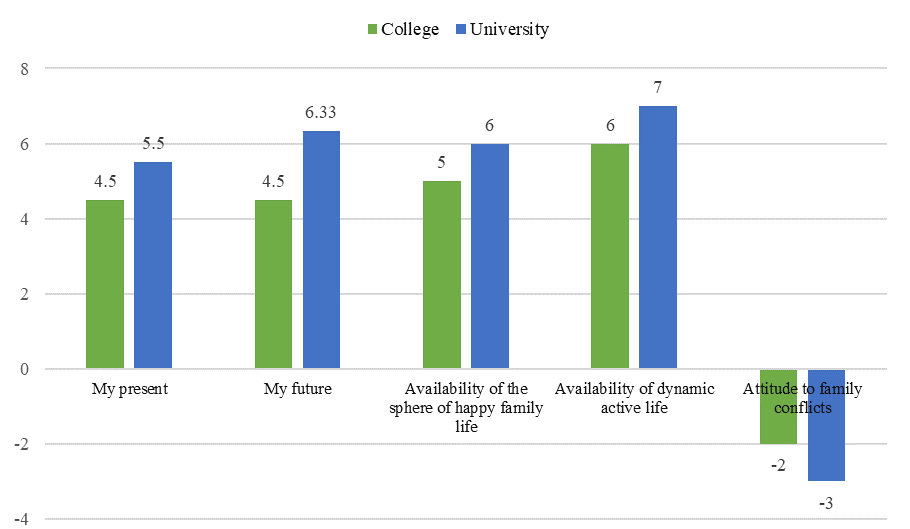
In the motivational component of family self-determination there were revealed significant distinctions for such marriage motives as security (U =46015.5 at p < 0.0001), success (U = 57839 at p < 0.0001), compensation of loneliness (U = 44976.5 at p < 0.0001) personal independence (U = 40865 at p < 0.0001), love (U = 49449 at p < 0.0001), material welfare ( = 50708.5 at p < 0.0001), revenge (U = 35559 at p < 0.0001), communication with people (U = 61939 at p < 0.0001), recognition by people around (U= 48078.5 at p < 0.0001), parentage ( U = 60151.5 at p < 0.0001), self-actualization ( U = 47543 at p < 0.0001), happiness ( U = 42412 at p < 0.0001). Bar charts (Figure
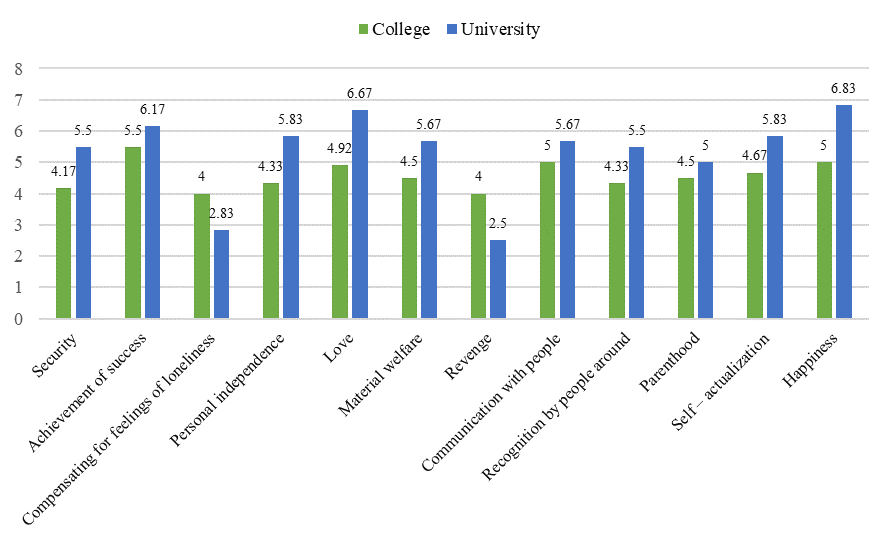
Distinctions at the level of statistical significance in the reflective component of family self – determination are established in the following indicators: self – confidence (U =113517.5 at p = 0.011), Locus of control -I (U =57814.5 at p = 0.005), Locus of control-Life (U =54931 at p < 0.0001), intensity of intrapersonal conflict in the marriage and family sphere (U=104071 at p < 0.0001). In Figure
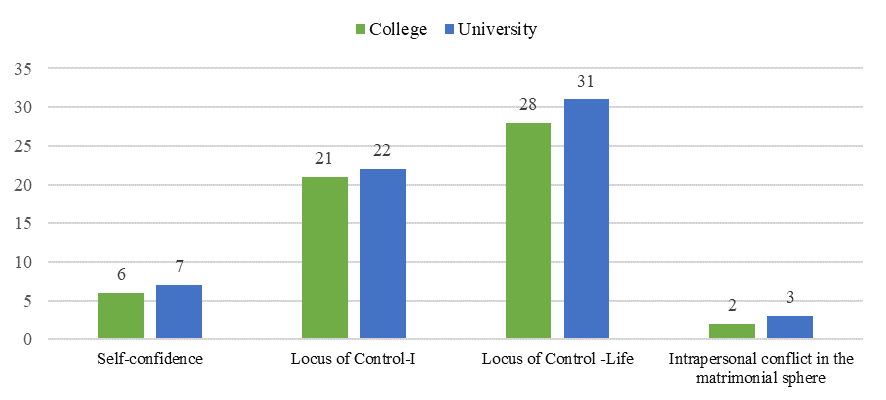
Results of diagnostics of types of family self-determination of student's youth
In order to determine the types of family self-determination, we used the previously presented algorithm (Merzlyakova, 2018b), which involves the first stage of factorial analysis by the principal components method, suitability analysis, and then the cluster analysis by the method
Conclusion
Thus, the level (secondary or higher) of professional education has a significant impact on the process of family self-determination of student’s youth.
7.1. The content-structural characteristics of family self-determination are determined by the level of education, which implies distinctions in educational and professional activities, educational environment and socio-psychological environment. University students differ from college students in a greater degree of cognitive development elements (I – future husband / wife, I – future father / mother, I – host / hostess, I – son / daughter), value-emotional (parent family, marriage, my mother, my father, my future family, value of happy family life, value of love, attitude towards future marriage partner, attitude towards family rest, purpose-in-life orientation), regulatory behavioral (present, future, availability of the sphere of happy family life and active life), motivational (security, success, personal independence, love, material welfare, communication with people, recognition of others, parenthood, self – actualization, happiness), reflective (self-confidence, Locus of control-I, Locus of control-Life) component of family self-determination. College students are characterized by increased unproductive motives for marriage (compensation for feelings of loneliness, revenge), less negative attitude towards family conflicts, less intrapersonal conflict in the marriage and family sphere than university students.
7.2. Family self-determination is typical and achieved for the majority of university students. Diffuse family self-determination prevails for college students. According to this we propose to introduce psychology-pedagogical model of development of family self-determination, implemented by us with the students of the university, in the educational process of colleges (Merzlyakova & Golubeva, 2018). The proposed psychology-pedagogical model of family self-determination for college students will ensure the success of the process of orientation of young people towards the family as self-value in the premarital period, the activation of the process of family self-determination as inextricably linked with personal and social identity, cultivation of family values and formation of need for a family lifestyle, development of psychological competence in the sphere of marriage and family relationships, readiness for marriage and family life.
References
- Alekseeva, E. N. (2015). Role of children-parents relations in forming family values of modern youth. In the World of Scientific Discoveries, Series A, 3(1), 5-14.
- Batarchuk, D. S. (2014). Problem of Family Relations in Interethnic Marriages: Socio-Psychological and Psychological-Acmeological Features. Acmeology, 3(51), 113-120.
- Dubrovina, I. V. (2015a). Preparation of youth for family life, or “forgotten” self-determination. Herald of Practical Psychology of education, 3(44), 17-23.
- Dubrovina, I. V. (2015b). Psychological Readiness for Family Life as an Aspect of Self-Determination. Family, Marriage and Parenthood in Modern Russia, 2, 86-95.
- Fantalova, E.B. (2001). Diagnostics and psychotherapy of internal conflict. Samara, 128 p.
- Karabanova, O. A. (2010). Family Psychological Counseling, Theory, Practice, Education. National Psychological Journal, 1(3), 104-107.
- Karabanova, O. A., & Molchanov, S. V. (2017). Family Factors in the Formation of Parental Attitudes of Young People at the Stage of Adulthood. National Psychological Journal, 2(26), 92-97.
- Karabanova, O. A., & Trofimova, O. V. (2013). Role of Parent Family in Shaping the Image of the Future Family. Modern Russian Family: Psychological Problems and Their Solutions: Monograph, 110 p.
- Leontiev, D.A. (2000). Test of meaning-life orientations (MLO). M, 18 p.
- Melnikova, I. A., & Sechko, A. V. (2016). Family Self- determination of University Students: Main Obstacles and Ways to Overcome Them. Psychology of Learning, 2, 44-51.
- Merzlyakova, S. V. (2014). A Children-parent Relationships as a Condition of Formation of the Family Self-determination of Youth. In the World of Scientific Discoveries, Series A., 2(2), 38-51.
- Merzlyakova, S. V. (2016). Sociocultural Determinants of Modern Youth’s Family Self-determination. Modern Research of Social Problems, 11(67), 123-135.
- Merzlyakova, S. V. (2018a). Cognitive Aspects of Family Self-determination of Young Males and Females. European Proceedings of Social and Behavioral Sciences, 56, 404-412.
- Merzlyakova, S. V. (2018b). The Typology of Modern Students’ Family Self-determination. The European Proceedings of Social & Behavioral Sciences, 53, 486-493.
- Merzlyakova, S. V., & Golubeva M. G. (2018). The Development of Family Self-determination of Student’s Youth. European Proceedings of Social and Behavioral Sciences, 56, 395-403.
- Merzlyakova, S. V., & Lokiaeva, N. S. (2018). Role of Family of Origin in Forming Family Self-determination in Student Youth. European Proceedings of Social and Behavioral Sciences, 60, 383-390.
- Merzlyakova, S. V., Zhilkina, V. A., Zobnina, О. А., & Sokova, N. А. (2018). Family Self- determination of Students in the Process of Professionalization. The European Proceedings of Social & Behavioral Sciences, 53, 347-355.
- Mukhtarova, A. H. (2016). Self-actualization as a Factor of Development of Family Self-determination in Adolescence. Modern Studies of Social Problems (Electronic Scientific Journal), 32(59), 282-288.
- Ovcharova, R. V. (2003). Psychological support of parenthood. Moscow: Publishing House of the Institute of Psychotherapy.
- Rean, A. A. (2017). Family Structure of Values of Young People. Russian Psychological Journal, 14(1), 62-76.
- Spivakovskaya, A. A. (1999). Psychotherapy: game, childhood, family. Part, 2, 430.
Copyright information

This work is licensed under a Creative Commons Attribution-NonCommercial-NoDerivatives 4.0 International License.
About this article
Publication Date
07 November 2019
Article Doi
eBook ISBN
978-1-80296-071-6
Publisher
Future Academy
Volume
72
Print ISBN (optional)
-
Edition Number
1st Edition
Pages
1-794
Subjects
Psychology, educational psychology, counseling psychology
Cite this article as:
Myasnyankina, N. G., Merzlyakova, S., Samitova, О. V., & Golubeva, M. G. (2019). Features Of Family Self-Determination Of Youth, Depending On The Level Of Education. In P. Besedová, N. Heinrichová, & J. Ondráková (Eds.), ICEEPSY 2019: Education and Educational Psychology, vol 72. European Proceedings of Social and Behavioural Sciences (pp. 100-109). Future Academy. https://doi.org/10.15405/epsbs.2019.11.8

